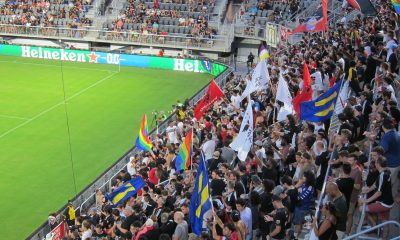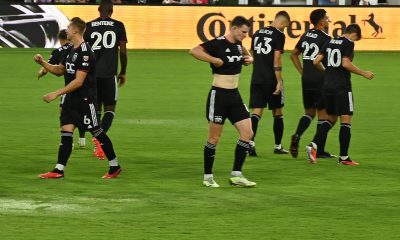Sports
Rookies & vets: Federal Triangles
Players of all skill levels find fun in gay league
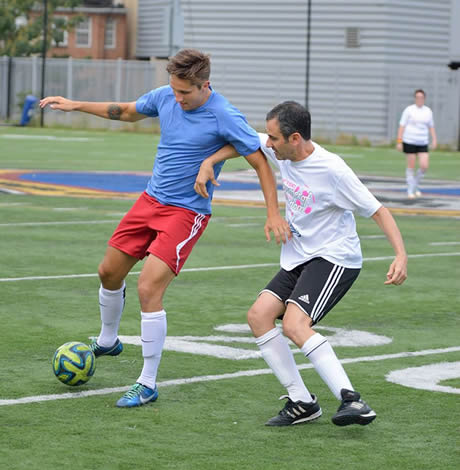
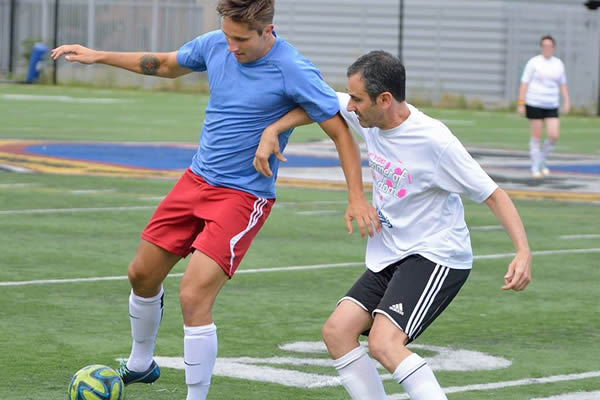
Scott Teribury, left, and Andy Sylvia on the field. (Photo courtesy Federal Triangles)
This week in the continuing Blade series on the rookies and veterans that make up the LGBT sports teams in the Washington area, we check in with two gay athletes from the Federal Triangles Soccer Club.
The Triangles host the Summer of Freedom League every summer and three tournaments throughout the year. In addition, their players travel to out-of-town tournaments and play in a variety of straight leagues in the area.
Scott Teribury grew up on military bases mostly in northern Virginia and competed in wrestling and soccer. He also ran cross country and track for his high school. During his collegiate years at Christopher Newport University, he played intramural soccer.
After moving to the D.C. area in 2012 to work in consulting, he Googled “gay sports” and found two clubs that interested him, D.C. Front Runners and the Federal Triangles Soccer Club. He ended up going with a friend to a Triangles pick-up game in 2013 and was recruited and put into a league mid-season.
“When I moved to the area I only knew a couple of people,” Teribury says. “The Triangles participate in so many things and the athletes are all so different. I have made many new friends including a best friend.”
Teribury has been competing in the area competitive leagues along with the Summer of Freedom League. He says the veterans are very supportive and are always looking to put new players on their teams. Several of the Triangles players have called Teribury the best rookie player to come along in years.
He has also been traveling with his teammates to tournaments and has played in Cleveland, Provincetown, Rehoboth Beach, Philadelphia and New York.
An ankle injury in October has him sidelined for the time being and he will have surgery in January. The recovery period will be four to six months, but he is already planning his return.
“The International Gay & Lesbian Football Association Worldcup is in Portland in August of 2016,” Teribury says. “I am hoping to be there.”
Andy Sylvia was born and raised on the eastern shore of Maryland and played club soccer up until his high school years. After finishing his degree at Salisbury University he moved to the D.C area for his work in human resources.
In 1998 he was looking for a new social activity and began playing pick-up games with the Triangles and is still playing with some of those same players.
“My first tournament with the Triangles was in Fort Lauderdale and it was great opportunity to bond with my teammates. Soccer has given me a fun group of people to travel with,” Sylvia says. “I have also met people from all over the world and it is a comfortable feeling to compete with those same athletes at the international events.”
Over the past 18 years, Sylvia has played in tournaments in Cologne, Dublin, London, Copenhagen, Sydney, Buenos Aires, Barcelona and Montreal among others. Along with Teribury, he is also planning on being at the Worldcup in Portland next year.
Sylvia says people come and go all the time and depending on the skill level of the rookie player coming in, you sometimes have to remind them that they are playing in a recreational league.
“Putting a team together is more than just throwing 11 people on the field,” Sylvia says. “A rookie player needs to learn how to play with his team and the team needs to learn how to play with him.”
Coming up for Sylvia this next year is the Liberty Bell tournament in Philadelphia, the Summer of Freedom League, the aforementioned Worldcup in Portland and the Rehoboth Beach Classic of which he is one of the founding players.
“Most of the teams I play on now have athletes that are over 30 years old,” Sylvia says. “The skill levels of the rookie players coming in today are much higher than they were before soccer became popular.”
India
Anaya Bangar challenges ban on trans women in female cricket teams
Former Indian cricketer Sanjay Bangar’s daughter has received support

Anaya Bangar, the daughter of former Indian cricketer Sanjay Bangar, has partnered with the Manchester Metropolitan University Institute of Sport in the U.K. to assess her physiological profile following her gender-affirming surgery and undergoing hormone replacement therapy.
From January to March 2025, the 23-year-old underwent an eight-week research project that measured her glucose levels, oxygen uptake, muscle mass, strength, and endurance after extensive training.
The results, shared via Instagram, revealed her metrics align with those of cisgender female athletes, positioning her as eligible for women’s cricket under current scientific standards. Bangar’s findings challenge the International Cricket Council’s 2023 ban on transgender athletes in women’s cricket, prompting her to call for a science-based dialogue with the Board of Control for Cricket in India and the ICC to reform policies for transgender inclusion.
“I am talking with scientific evidence in my hand,” Bangar said in an interview posted to her Instagram page. “So, I hope, this makes an impact and I will be hoping to BCCI and ICC talking with me and discussing this further.”
On Nov. 21, 2023, the ICC enacted a controversial policy barring trans women from international women’s cricket. Finalized after a board meeting in Ahmedabad, India, the regulation prohibits any trans player who has experienced male puberty from competing, irrespective of gender-affirming surgery or hormone therapy. Developed through a 9-month consultation led by the ICC’s Medical Advisory Committee, the rule aims to safeguard the “integrity, safety, and fairness” of women’s cricket but has drawn criticism for excluding athletes like Canada’s Danielle McGahey, the first trans woman to play internationally. The policy, which allows domestic boards to set their own rules, is slated for review by November 2025.
Bangar shared a document on social media verifying her participation in a physiological study at the Manchester Metropolitan University Institute of Sport, conducted from Jan. 20 to March 3, 2025, focused on cricket performance. The report confirmed that her vital metrics — including haemoglobin, blood glucose, peak power, and mean power — aligned with those of cisgender female athletes. Initially, her fasting blood glucose measured 6.1 mmol/L, slightly above the typical non-diabetic range of 4.0–5.9 mmol/L, but subsequent tests showed it normalized, reinforcing the study’s findings that her physical profile meets female athletic standards.
“I am submitting this to the BCCI and ICC, with full transparency and hope,” said Bangar. “My only intention is to start a conversation based on facts not fear. To build space, not divide it.”
In a letter to the BCCI and the ICC, Bangar emphasized her test results from the Manchester Metropolitan University study. She explained that the research aimed to assess how hormone therapy had influenced her strength, stamina, haemoglobin, glucose levels, and overall performance, benchmarked directly against cisgender female athletic standards.
Bangar’s letter to the BCCI and the ICC clarified the Manchester study was not intended as a political statement but as a catalyst for a science-driven dialogue on fairness and inclusion in cricket. She emphasized the importance of prioritizing empirical data over assumptions to shape equitable policies for trans athletes in the sport.
Bangar urged the BCCI, the world’s most influential cricket authority, to initiate a formal dialogue on trans women’s inclusion in women’s cricket, rooted in medical science, performance metrics, and ethical fairness. She called for the exploration of eligibility pathways based on sport-specific criteria, such as haemoglobin thresholds, testosterone suppression timelines, and standardized performance testing. Additionally, she advocated for collaboration with experts, athletes, and legal advisors to develop policies that balance inclusivity with competitive integrity.
“I am releasing my report and story publicly not for sympathy, but for truth. Because inclusion does not mean ignoring fairness, it means measuring it, transparently and responsibly,” said Bangar in a letter to the BCCI. “I would deeply appreciate the opportunity to meet with you or a representative of the BCCI or ICC to present my findings, discuss possible policy pathways, and work towards a future where every athlete is evaluated based on real data, not outdated perceptions.”
Before her transition, Bangar competed for Islam Gymkhana in Mumbai and Hinckley Cricket Club in the U.K., showcasing her talent in domestic cricket circuits. Her father, Sanjay Bangar, was a dependable all-rounder for the Indian national cricket team from 2001 to 2004, playing 12 test matches and 15 One Day Internationals. He later served as a batting coach for the Indian team from 2014 to 2019, contributing to its strategic development.
Cricket in India is a cultural phenomenon, commanding a fanbase of more than 1 billion, with more than 80 percent of global cricket viewership originating from the country.
The International Cricket Council, the sport’s governing body, oversees 12 full member nations and more than 90 associate members, with the U.S. recently gaining associate member status in 2019 and co-hosting the 2024 ICC Men’s T20 World Cup. The BCCI generated approximately $2.25 billion in revenue in the 2023–24 financial year, primarily from the Indian Premier League, bilateral series, and ICC revenue sharing. The ICC earns over $3 billion from media rights in India alone for the 2024–27 cycle, contributing nearly 90 percent of its global media rights revenue, with the BCCI receiving 38.5 percent of the ICC’s annual earnings, approximately $231 million per year.
Women’s cricket in India enjoys a growing fanbase, with over 300 million viewers for the Women’s Premier League in 2024, making it a significant driver of the sport’s global popularity. The International Cricket Council oversees women’s cricket in 12 full member nations and over 90 associate members, with the U.S. fielding a women’s team since gaining associate status in 2019 and competing in ICC events like the 2024 Women’s T20 World Cup qualifiers. The BCCI invests heavily in women’s cricket, allocating approximately $60 million annually to the WPL and domestic programs in 2024–25, while contributing to the ICC’s $20 million budget for women’s cricket development globally. India’s media market for women’s cricket, including WPL broadcasting rights, generated $120 million in 2024, accounting for over 50 percent of the ICC’s women’s cricket media revenue.
“As a woman, I feel when someone says that they are women, then they are, be trans or cis. A trans woman is definitely the same as a cis woman emotionally and in vitals, and specially, when someone is on hormone replacement therapy. Stopping Anaya Bangar from playing is discrimination and violation of her rights. It is really sad and painful that every transwoman need to fight and prove their identity everywhere,” said Indrani Chakraborty, an LGBTQ rights activist and a mother of a trans woman. “If ICC and BCCI is stopping her from playing for being transgender, then I will say this to be their lack of awareness and of course the social mindsets which deny acceptance.”
Chakraborty told the Blade that Bangar is an asset, no matter what. She said that the women’s cricket team will only benefit by participation, but the discriminating policies are the hindrance.
“Actually the transgender community face such discrimination in every sphere. In spite of being potent, they face rejection. This is highly inhuman. These attitudes is regressive and will never let to prosper. Are we really in 2025?,” said Chakraborty. “We, our mindset and the society are the issues. We, as a whole, need to get aware and have to come together for getting justice for Anaya. If today, we remain silent, the entire community will be oppressed. Proper knowledge of gender issues need to be understood.”
The BCCI and the International Cricket Council have not responded to the Blade’s repeated requests for comment.
Sports
English soccer bans transgender women from women’s teams
British Supreme Court last month ruled legal definition of woman limited to ‘biological women’
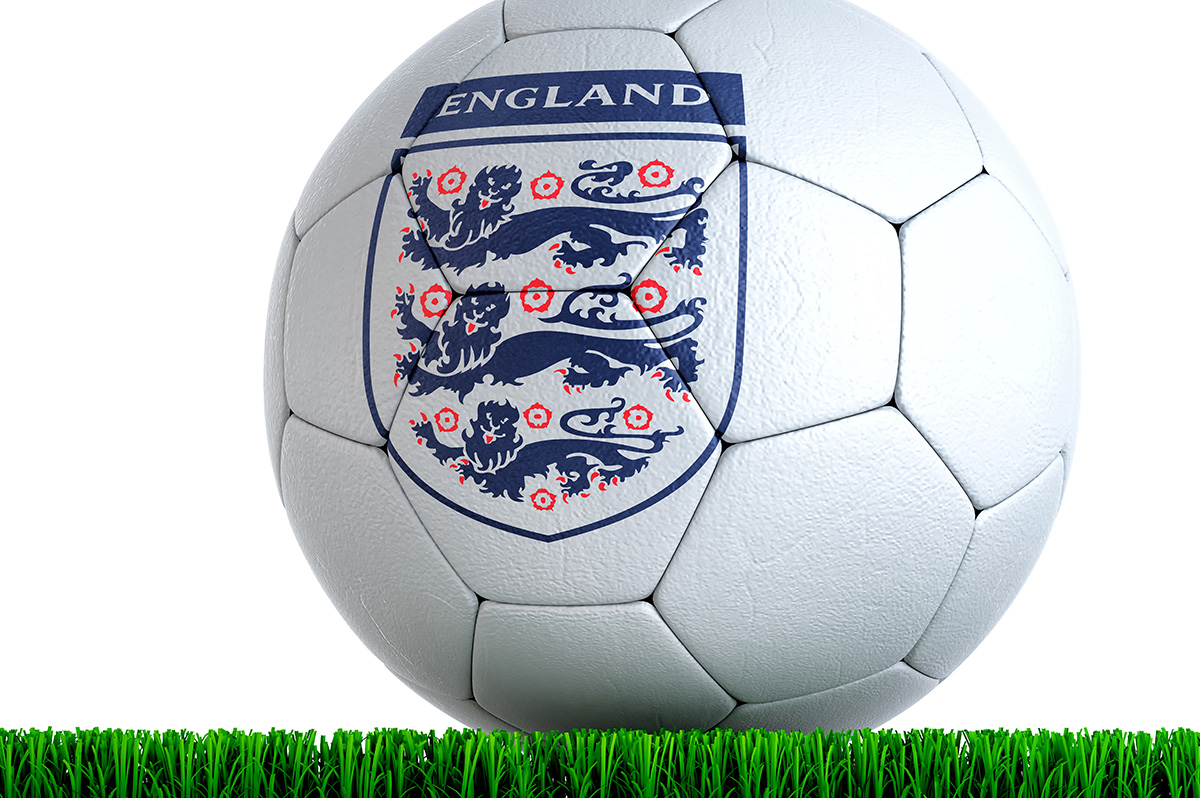
The organization that governs English soccer on Thursday announced it will no longer allow transgender women to play on women’s teams.
The British Supreme Court on April 16 ruled the legal definition of a woman is limited to “biological women” and does not include trans women. The Football Association’s announcement, which cites the ruling, notes its new policy will take effect on June 1.
“As the governing body of the national sport, our role is to make football accessible to as many people as possible, operating within the law and international football policy defined by UEFA (Union of European Football Associations) and FIFA,” said the Football Association in a statement that announced the policy change. “Our current policy, which allows transgender women to participate in the women’s game, was based on this principle and supported by expert legal advice.”
“This is a complex subject, and our position has always been that if there was a material change in law, science, or the operation of the policy in grassroots football then we would review it and change it if necessary,” added the Football Association.
The Football Association also acknowledged the new policy “will be difficult for people who simply want to play the game they love in the gender by which they identify.”
“We are contacting the registered transgender women currently playing to explain the changes and how they can continue to stay involved in the game,” it said.
The Football Association told the BBC there were “fewer than 30 transgender women registered among millions of amateur players” and there are “no registered transgender women in the professional game” in England, Scotland, Wales, and Northern Ireland.
The Scottish Football Association, which governs soccer in Scotland, is expected to also ban trans women from women’s teams.

FIFA has announced Saudi Arabia will host the 2034 World Cup, despite concerns over its human rights record that includes the death penalty for homosexuality.
The Associated Press reported FIFA confirmed the decision on Dec. 18. The AP noted Saudi Arabia is the only country that bid to host the 2034 World Cup.
“This is a historic moment for Saudi Arabia and a dream come true for all our 32 million people who simply love the game,” said Sport Minister Prince Abdulaziz bin Turki Al- Faisal, who is also president of the Saudi Olympic and Paralympic Committee, in a statement the Saudi Press Agency posted to its website.
Saudi Arabia is among the handful of countries in which consensual same-sex sexual relations remain punishable by death.
A U.S. intelligence report concluded Saudi Crown Prince Mohammed bin Salman “likely approved” the murder of Jamal Khashoggi, a Washington Post columnist, inside the Saudi Consulate in Istanbul in 2018. A federal judge in 2022 dismissed a lawsuit against Prince Mohammed after the Biden-Harris administration said he was immune to the lawsuit because he is the country’s prime minister.
Human rights activists have also criticized the Saudi government over the treatment of women, migrant workers, and other groups in the country.
“No one should be surprised by this,” Cyd Zeigler, Jr., co-founder of Outsports.com, an LGBTQ sports website, told the Washington Blade in an email after FIFA confirmed Saudi Arabia will host the 2034 World Cup. “FIFA, the International Olympic Committee, and many other world governing bodies routinely turn to authoritarian countries with terrible human-rights records to host major sporting events. There are simply few other countries willing to spend the billions of dollars it takes to build the needed infrastructure.”
Peter Tatchell, a long-time LGBTQ activist from the U.K. who is director of the Peter Tatchell Foundation, in a statement described FIFA’s decision as “a betrayal of the values that football should stand for: Inclusivity, fairness, and respect for human rights.”
“This is not about football; it’s about sportswashing,” said Tatchell. “The Saudi regime is using the World Cup to launder its international image and distract from its brutal abuses. By granting them this platform, FIFA is complicit in whitewashing their crimes.”
Qatar, which borders Saudi Arabia, hosted the 2022 World Cup.
Consensual same-sex sexual relations remain criminalized in Qatar.
“Saudi Arabia was the only country to bid for the 2034 FIFA World Cup,” said Zeigler. “So, until FIFA, the IOC (International Olympic Committee) and other governing bodies ban major human-rights violators from hosting, we’ll continue to see events like this in Saudi Arabia, China, Qatar, and other countries with terrible LGBTQ rights issues.”
The Blade has reached out to FIFA and the Saudi government for comment.
-

 U.S. Supreme Court3 days ago
U.S. Supreme Court3 days agoSupreme Court upholds ACA rule that makes PrEP, other preventative care free
-

 U.S. Supreme Court3 days ago
U.S. Supreme Court3 days agoSupreme Court rules parents must have option to opt children out of LGBTQ-specific lessons
-

 India5 days ago
India5 days agoIndian court rules a transgender woman is a woman
-

 National4 days ago
National4 days agoEvan Wolfson on the 10-year legacy of marriage equality

